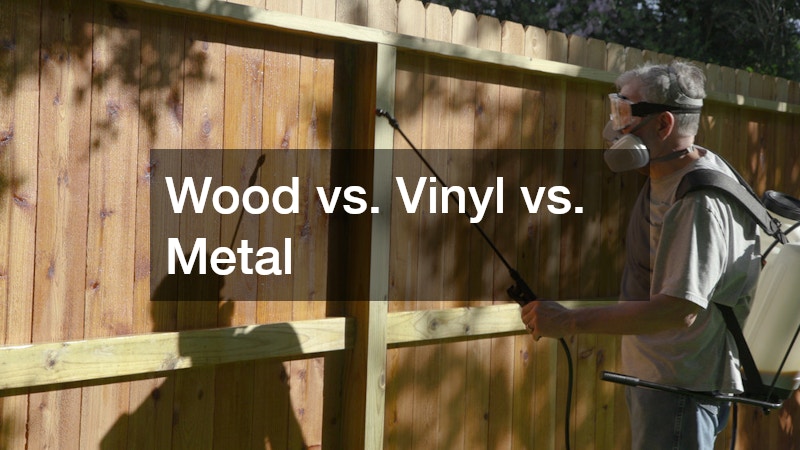Comparing Fence Companies What to Look for and Wh
In today’s competitive market, choosing the right fence company can be a daunting task. Understanding what to look for and why it matters will arm you with the knowledge needed to make an informed decision. This article will guide you through the most critical factors to consider when comparing fence companies.
Customer Reviews and Testimonials
In the digital age, online reviews and testimonials are invaluable tools for assessing a company’s credibility and service quality. Consistent positive feedback from a wide range of clients usually indicates that the company maintains high standards across all its projects.
By considering peer experiences, potential customers can make informed judgments about the reliability and professionalism of a fence company.
However, it is vital to read reviews critically, distinguishing between genuine client testimonials and potentially biased or fraudulent ones. Websites such as Google Reviews and Yelp can offer diverse insights, providing both praising comments and constructive critiques. Additionally, video testimonials and case studies on a company’s website can offer deeper insights into client satisfaction and the quality of work delivered.
Personal recommendations from friends or family also carry significant weight in the decision-making process. Trusted sources can relay their firsthand experiences, providing context beyond what is written in an online review. These testimonials can offer guidance on the nuances of working with a particular company, highlighting strengths and potential areas for improvement.
Licensing and Insurance
Ensuring that a fence company holds the appropriate licenses and insurance is essential for safeguarding your investment. Licensed companies are often required to meet regulatory standards, ensuring that they adhere to building codes and industry norms during installation. This compliance minimizes the risk of encountering legal issues or structural problems with your fence in the future.
Insurance serves to protect both the client and the company from unforeseen incidents that can occur during the installation process. For instance, if an accident happens on your property and the company lacks proper insurance coverage, you might be held liable. Hence, verifying a company’s insurance documentation is a critical step in the vetting process.
Wood vs. Vinyl vs. Metal
Choosing the appropriate material for your fence is dependent on your specific needs and preferences, such as aesthetics, durability, and budget. Wood fences are often chosen for their natural beauty and ability to blend seamlessly into landscapes, while vinyl offers low-maintenance and weather-resistant properties. Metal fences, such as aluminum or wrought iron, provide durability and security, making them suitable for high-security needs.
Each material has its own set of advantages and drawbacks, so consideration of the local climate and your property’s intended use is crucial. For instance, wood might warp or rot in areas with excessive moisture, whereas vinyl could become brittle in extremely cold temperatures. Metal is highly durable but may require anti-rust treatments in high-moisture environments.
Custom Design Options
For property owners with unique needs or specific aesthetic visions, custom design options offered by fencing companies can be a significant factor. Companies that provide custom design services demonstrate greater flexibility and creativity in meeting diverse client demands. This ability to design bespoke solutions ensures that your fence not only serves its functional purpose but also complements the overall look of your property.
Custom designs can include a variety of elements such as intricate patterns, customized heights, or specific material combinations. These personalized touches can add significant value and curb appeal, turning a standard boundary fence into a standout feature. Companies with an in-house design team and skilled craftspeople are often better equipped to execute complex custom designs.
Moreover, working closely with the design team allows clients to contribute to the creative process, ensuring the final product aligns with their vision. This collaboration can foster a stronger relationship between the client and the company, resulting in higher satisfaction with the completed project. The potential for personalization is an additional factor to consider when choosing a fencing company.
Environmental Considerations
As eco-consciousness grows, the demand for environmentally friendly fencing options increases. Companies that offer sustainable materials, such as bamboo or recycled composites, cater to clients who prioritize green building practices. Choosing eco-friendly materials not only reduces the environmental footprint but can also offer additional benefits like enhanced durability and low maintenance.
The production process and sourcing of materials are key aspects in evaluating the environmental impact of a fencing project. Opting for a company that emphasizes renewable resources and sustainable practices ensures a lower carbon footprint. Some companies go further by maintaining efficient installation processes to minimize waste and environmental disruption.
Clients may also want to consider the recyclability of fencing materials at the end of their life cycle. Many modern materials can be repurposed or recycled, extending their utility beyond their initial use. Emphasizing environmental considerations when selecting a fence company not only benefits the planet but also often results in more durable, high-quality products.
Choosing the right fence company involves more than just picking the lowest price or the company nearest to you. By focusing on qualities such as experience, transparent pricing, and materials, you can select a company that will meet your expectations and provide the fence that serves your needs. Take your time to research, compare, and consult with multiple companies to make the most informed decision for your fencing project.
.






